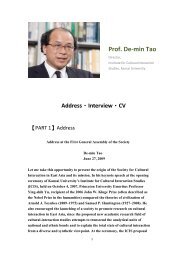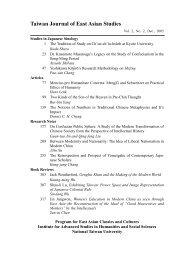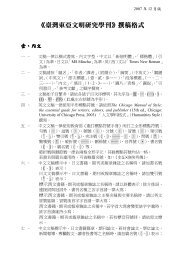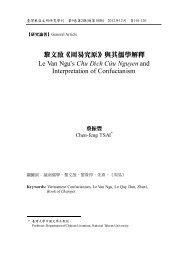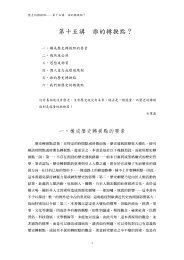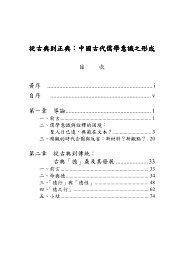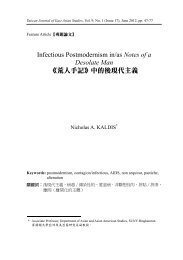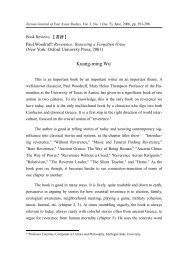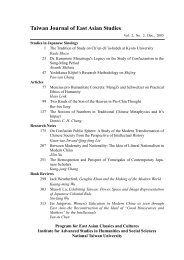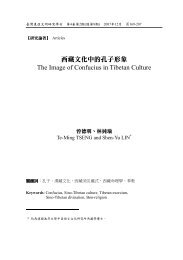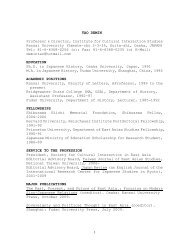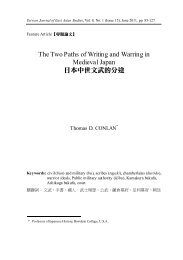臺灣東亞文明研究學刊 - 東亞經典與文化研究計畫 - 國立臺灣大學
臺灣東亞文明研究學刊 - 東亞經典與文化研究計畫 - 國立臺灣大學
臺灣東亞文明研究學刊 - 東亞經典與文化研究計畫 - 國立臺灣大學
You also want an ePaper? Increase the reach of your titles
YUMPU automatically turns print PDFs into web optimized ePapers that Google loves.
Jörn RÜSEN Future-directed Elements of an European Historical Culture 221<br />
solve the problem of the clash of civilizations since it negates any cross-cultural<br />
idea of reconciling its oppositions and antagonisms. A clash can only be criticized<br />
and even avoided on the level of intellectual discussion and reflection if elements of<br />
a comprehensive rule are introduced into this relativism. Introducing argumentative<br />
elements as conditions for respect and recognition means to re-introduce<br />
universalistic principles. So it is not a question, whether one should conceptualize<br />
universalistic elements of cultural identity or not. But we should look out for what<br />
kind of universalism can be taken into consideration.<br />
Here I think Europe can contribute to the solution of this problem. With the<br />
already described new elements of historical culture Europe is able to<br />
reconceptualize its own universalistic traditions in favour of a non-ethnocentric<br />
quality of identity: It may reformulate relevant universals like humankind, truth<br />
claims, modes of rational thinking, rule of law, democratic criteria for legitimizing<br />
political domination etc. In a simple logic argumentation one can describe this<br />
reconceptualization as a change from exclusion to inclusion. 11<br />
What does this mean for European historical culture? This change<br />
consequently necessitates a universalistic perspective of European historical<br />
identity. This new universalism is no longer an essentialist metahistorical<br />
universalism in the sense of traditional or even up-to-date typologies of culture. On<br />
the contrary: This universalism is an "idea" (to quote Kant's famous essay), a<br />
concept of humankind in a temporal perspective, within which Europe's relationship<br />
to other cultures appears as a process from excluding to including otherness in its<br />
own identity.<br />
11 That this is possible can be shown by a re-interpretation of classical texts representing European<br />
universalistic ideas. I have tried it with Immanuel Kant's essay "Idea of a Universal History in a<br />
Cosmopolitan Intent" from 1784 (Jörn Rüsen, "Following Kant: A European Idea of a Universal<br />
History with an Intercultural Intent," in Groniek Historisch Tijdschrift, 160 (2003), pp. 359-368;<br />
also in Ex/Change: Newsletter of the Centre for Cross-Cultural Studies, 10 (July, 2004), pp. 4-8;<br />
Chinese "Zunzhi Kangde: Gua wenhua shiye xia Duzhourende" in Historiography Quarterly, 49,<br />
(2004), pp. 117-122.<br />
xiii



